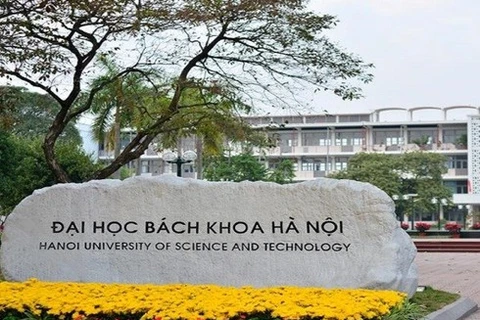 The Hanoi University of Science and Technology’s campus. The university receives five-star UPM ranking. (Photo: Hust.vn)
The Hanoi University of Science and Technology’s campus. The university receives five-star UPM ranking. (Photo: Hust.vn)
Hanoi (VNA) – The Vietnam National University, Hanoi (VNU) launched a higher education comparative ranking system developed by Vietnam named “University Performance Metrics” (UPM) at an international workshop in Hanoi on August 18.
UPM is a rating system for higher education institutions initiated by researchers from the VNU, the development of which was funded by the Vietnam Ministry of Education and Training. It is a suitable rating tool for universities in the region who aim to benchmark with the Asian top 100 universities.
It evaluates university performance through 54 indicators across eight categories that score a total of 1,000. The categories include Strategic Governance (five indicators, accounting for 6 percent of the total score); Education (15 indicators, 35 percent); Research (four indicators, 20 percent); Innovation (four indicators, 11 percent); Innovation Ecosystem (four indicators, 6 percent); IT Infrastructure (10 indicators, 10 percent); Internationalisation (nine indicators, 6 percent); and Community Services (three indicators, 6 percent).
Evaluation results will be presented in the form of an overall score for the whole institution, and a score for each category, corresponding to a number of Stars ranging from 1 – 5.
UPM five-star universities have high national reputation and are internationally recognized. UPM four-star universities are well-known not only in the country but also in the region. UPM three-star universities have their roles in the national higher education (HE) system and can facilitate student mobility in ASEAN countries.
In his remarks at the event jointly organised by VNU and the ASEAN University Network (AUN), Minister of Education and Training Phung Xuan Nha said Vietnam’s higher education has made strong strides towards autonomy, enhancing accreditation, publicity of education quality, and approaching the 4th Industrial Revolution.
So far, as many as 160 Vietnamese higher education institutions and more than 300 training programmes have been accredited by prestigious domestic and international organisations, he noted, adding that the higher education institutions are accessing university governance tools to identify their competence.
Vietnam has three educational institutions named in the list of 1,000 leading education institutions in the world, he said, adding that the country’s higher education is ranked 68th out of nearly 200 countries and territories worldwide.
He stressed the need to have quality management tools in order to improve university governance capacity both at the macro and micro level, especially to compare quality assurance indicators among higher education institutions.
UPM is a data and analysis centre, which can provide consultancy and support to the national higher education system, as well as to national and regional higher education institutions, he said.
Higher education institutions can use UPM to self-evaluate their performance, at the same time use it as a tool for strategic management, brand development, and partner development, he went on.
Prof. Dr. Nguyen Huu Duc, former vice president of VNU, who is directly in charge of the system, said that the world’s top 1,000 universities only account for about 3 percent of the total higher institutions globally. UPM focuses on the other 97 percent, or more than 28,000 universities, which have a major role and contribution but has not been properly appreciated, he noted.
 UPM is a rating system for higher education institutions initiated by researchers from the Vietnam National University-Hanoi (VNU). (Photo: vnu.edu.vn)
UPM is a rating system for higher education institutions initiated by researchers from the Vietnam National University-Hanoi (VNU). (Photo: vnu.edu.vn)
So far, nearly 40 universities in Vietnam and other ASEAN member nations have voluntarily applied the UPM system for quality evaluation.
Five research-oriented higher education institutions rated five-star include VNU and its two members – University of Natural Sciences and University of Technology, Hanoi University of Science and Technology, and University of Kasetsar (Thailand).
Executive Director of the ASEAN University Network (AUN) Choltis Dhirathiti said the Secretariat of AUN supports UPM because the system helps open up a new approach in the field of university quality evaluation, with eight groups of criteria and 54 highly synthetic indicators.
UPM can provide reliable information serving the comprehensive comparison and evaluation of the quality of universities, he said./.























